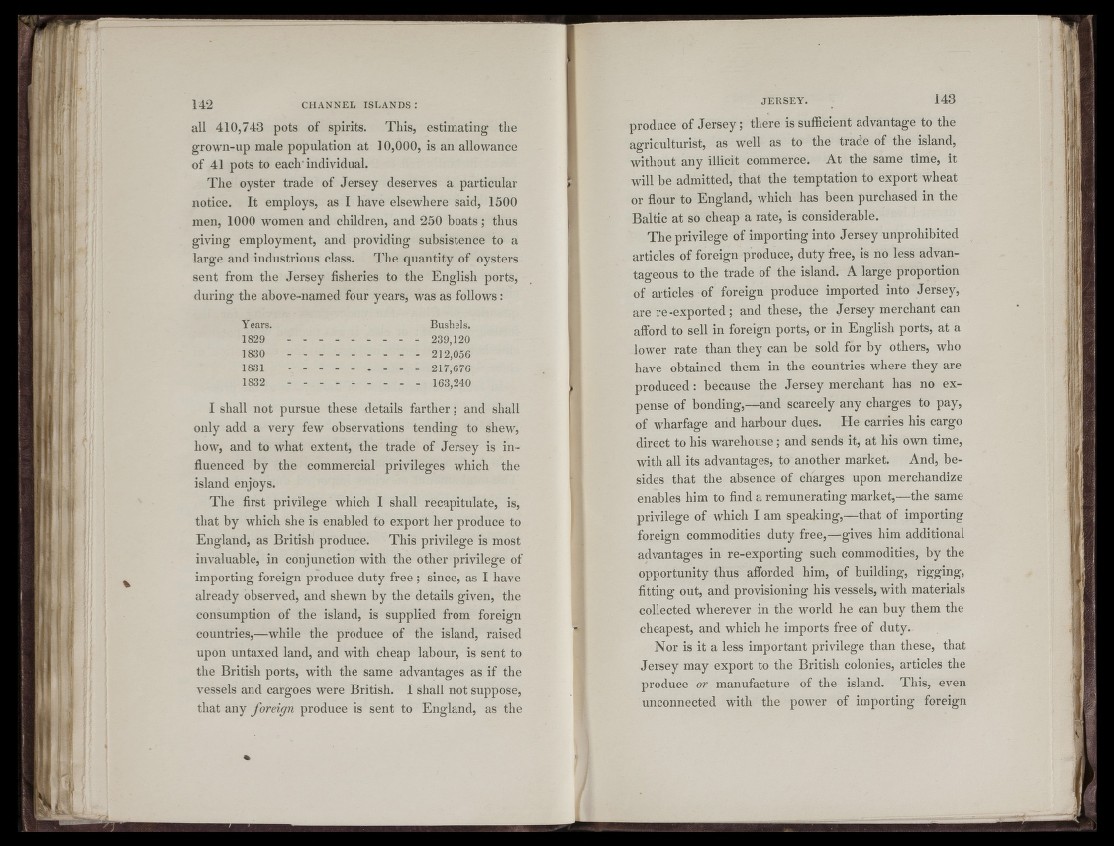
i
it a
Ii
i f
i i
all 410,743 pots of spirits. This, estimating the
grown-up male population at 10,000, is an allowance
of 41 pots to each'individual.
The oyster trade of Jersey deserves a particular
notice. It employs, as I have elsewhere said, 1500
men, 1000 women and children, and 250 boats; thus
giving employment, and providing subsistence to a
large and industrious class. The quantity of oysters
sent from the Jersey fisheries to the English ports,
during the above-named four years, was as follows:
Years. Bushels.
1829 - - - - ............................. 239,120
1830 212,056
1831 - - ............................................ 217,676
1832 - - - .................................... 163,240
I shall not pursue these details farther; and shall
only add a very few observations tending to shev^,
how, and to what extent, the trade of Jersey is in-
fiuenced by the commercial privileges which the
island enjoys.
The first privilege which I shall recapitulate, is,
that by which she is enabled to export her produce to
England, as British produce. This privilege is most
invaluable, in conjunction with the other privilege of
importing foreign produce duty fre e ; since, as I have
already observed, and shewn by the details given, the
consumption of the island, is supplied from foreign
countries,—while the produce of the island, raised
upon untaxed land, and with cheap labour, is sent to
the British ports, with the same advantages as if the
vessels and cargoes were British. I shall not suppose,
that any foreign produce is sent to England, as the
produce of Jersey; there is sufficient advantage to the
agriculturist, as well as to the trade of the island,
without any illicit commerce. At the same time, it
will be admitted, that the temptation to export wheat
or flour to England, which has been purchased in the
Baltic at so cheap a rate, is considerable.
The privilege of importing into Jersey unprohibited
articles of foreign produce, duty free, is no less advantageous
to the trade of the island. A large proportion
of articles of foreign produce imported into Jersey,
are re-exported; and these, the Jersey merchant can
aiford to sell in foreign ports, or in English ports, at a
lower rate than they can be sold for by others, who
have obtained them in the countries where they are
produced : because the Jersey merchant has no expense
of bonding,—and scarcely any charges to pay,
of wharfage and harbour dues. He carries his cargo
direct to his warehouse; and sends it, at his own time,
with all its advantages, to another market. And, besides
that the absence of charges upon merchandize
enables him to find a remunerating market,—the same
privilege of which I am speaking,—that of importing
foreign commodities duty free,—gives him additional
advantages in re-exporting such commodities, by the
opportunity thus aiforded him, of building, rigging,
fitting out, and provisioning his vessels, with materials
collected wherever in the world he can buy them the
cheapest, and which he imports free of duty.
Nor is it a less important privilege than these, that
Jersey may export to the British colonies, articles the
produce or manufacture of the island. This, even
unconnected with the power of importing foreign
Ii